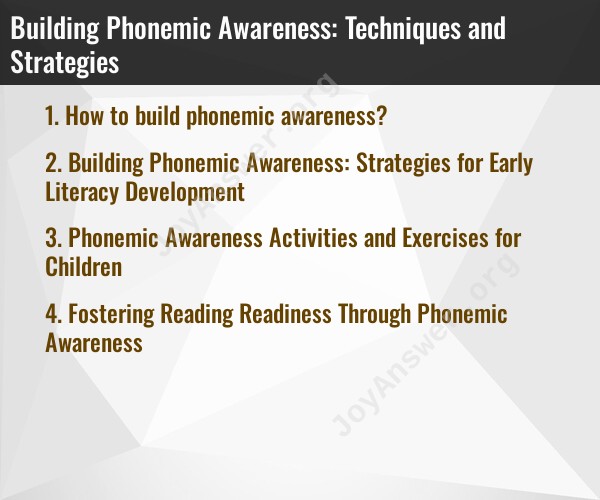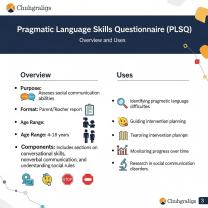How to build phonemic awareness?
Phonemic awareness is the ability to hear, identify, and manipulate individual sounds (phonemes) in spoken language. Developing phonemic awareness is a crucial foundational skill for reading and writing. Here are techniques and strategies to help build phonemic awareness in children and beginning readers:
Rhyming Activities:
- Engage in rhyming games and activities where children identify and produce words that rhyme. For example, "cat," "hat," "mat."
- Read rhyming books and poems.
Sound Discrimination:
- Play games that involve discriminating between sounds. For example, ask children to identify the beginning sound in words like "dog" and "cat."
- Use objects or pictures to help children focus on the initial, middle, or ending sounds in words.
Segmenting Words:
- Ask children to break words into their individual sounds. For example, in the word "cat," they should identify the /k/, /æ/, and /t/ sounds.
- Use hand claps, tokens, or sound boxes to represent each sound.
Blending Sounds:
- Have children blend individual sounds into words. For example, say the sounds /k/, /æ/, and /t/, and ask them to blend them to form the word "cat."
Sound Isolation:
- Focus on individual sounds within words. Ask children to identify the sound at the beginning, middle, or end of a word.
Phoneme Deletion and Substitution:
- Have children remove or substitute specific sounds in words. For example, ask them to say "cat" without the /k/ sound or change "cat" to "hat" by substituting the /k/ with /h/.
Sound Play:
- Create playful and engaging activities that involve producing and manipulating sounds, such as tongue twisters and silly wordplay.
Alphabet Knowledge:
- Teach children the names and sounds of the letters of the alphabet. This provides the foundation for recognizing and manipulating phonemes.
Singing and Chanting:
- Sing songs and chants that emphasize individual sounds and phoneme recognition. For example, sing the alphabet song or other phonics-related songs.
Use Multisensory Techniques:
- Incorporate tactile and kinesthetic activities, such as using sandpaper letters, letter tiles, or magnetic letters to physically manipulate and form words.
Read Aloud:
- Regularly read aloud to children and encourage them to listen for and identify specific sounds in words.
Games and Puzzles:
- Play phonics games, word puzzles, and activities that encourage sound awareness and manipulation.
Word Families:
- Introduce word families (e.g., -at, -an, -it) and explore rhyming words within the same family.
Progress Gradually:
- Start with simpler phonemic awareness activities and gradually increase the complexity as children become more proficient.
Remember that phonemic awareness is an auditory skill, so listening and speaking are essential components. These activities should be interactive and engaging to make learning fun for children. Building phonemic awareness is a gradual process, and consistency in practice is key to developing this foundational skill for literacy.
Building Phonemic Awareness: Strategies for Early Literacy Development
Phonemic awareness is the ability to hear and manipulate the individual sounds (phonemes) in spoken words. It is a crucial skill for early literacy development, as it is the foundation for learning to read and write.
There are a number of strategies that parents and educators can use to help children develop phonemic awareness.
Here are some tips:
- Expose children to a variety of oral language experiences: Talk to your child often, read aloud to them regularly, and encourage them to participate in conversations. The more exposure children have to language, the better equipped they will be to develop phonemic awareness.
- Play word games and sing songs: Word games and songs are a fun and engaging way to help children develop phonemic awareness. There are many different types of word games and songs that can be used, such as rhyming games, blending games, and segmentation games.
- Provide children with opportunities to manipulate sounds: Give children opportunities to experiment with the sounds in words. This can be done through activities such as clapping syllables, making silly noises, and changing the beginning, middle, or end sounds of words.
Phonemic Awareness Activities and Exercises for Children
Here are some specific activities and exercises that parents and educators can use to help children develop phonemic awareness:
- Rhyming games: Play games where children have to identify words that rhyme.
- Blending games: Play games where children have to blend individual sounds together to make words.
- Segmentation games: Play games where children have to segment words into individual sounds.
- Onset-rime games: Play games where children have to identify the onset (beginning sound) and the rime (ending sound) of words.
- Syllable counting: Play games where children have to count the syllables in words.
- Same sound games: Play games where children have to identify words that start with the same sound or end with the same sound.
- Sound sorting: Play games where children have to sort words by their sound.
Fostering Reading Readiness Through Phonemic Awareness
By helping children develop phonemic awareness, parents and educators can foster reading readiness. Children with strong phonemic awareness skills are more likely to be successful readers.
Here are some tips for fostering reading readiness through phonemic awareness:
- Start early: The earlier children start developing phonemic awareness skills, the better. Parents can start talking to their children about the sounds in words and playing word games with them from a very young age.
- Make it fun: Phonemic awareness activities should be fun and engaging for children. If children are not having fun, they are less likely to be motivated to learn.
- Be patient: It takes time for children to develop phonemic awareness skills. Parents and educators should be patient and supportive, and they should continue to provide children with opportunities to practice their skills.
By following these tips, parents and educators can help children develop phonemic awareness skills and foster reading readiness.












